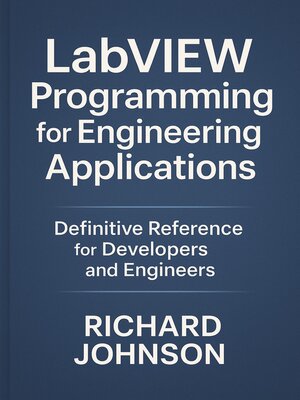LabVIEW Programming for Engineering Applications
ebook ∣ Definitive Reference for Developers and Engineers
By Richard Johnson

Sign up to save your library
With an OverDrive account, you can save your favorite libraries for at-a-glance information about availability. Find out more about OverDrive accounts.
Find this title in Libby, the library reading app by OverDrive.



Search for a digital library with this title
Title found at these libraries:
| Library Name | Distance |
|---|---|
| Loading... |
"LabVIEW Programming for Engineering Applications"
"LabVIEW Programming for Engineering Applications" is an authoritative and comprehensive guide designed for professionals and advanced students seeking to master the full spectrum of LabVIEW development. The book delves into the foundational and advanced concepts of LabVIEW's dataflow paradigm, memory management, parallelism, and error handling, providing a deep technical understanding for efficient and robust software design. Readers are introduced to powerful techniques for programmatic control, execution optimization, and sophisticated timing strategies to ensure deterministic and scalable applications.
Structured around contemporary engineering challenges, the book explores industry-proven design patterns including producer-consumer frameworks, state machines, plugin architectures, and the actor model to promote modular, maintainable, and testable systems. Practical chapters on data acquisition, instrument control, and hardware abstraction detail how to build high-performance, fail-safe applications for industrial and laboratory automation. Further, real-time and FPGA programming are addressed with in-depth coverage of multithreading, load balancing, and deterministic execution, empowering readers to harness the full capabilities of LabVIEW across embedded, desktop, and distributed environments.
Beyond technical mastery, the guide advances the reader's expertise in modern software engineering practices such as object-oriented design, continuous integration, code quality assurance, and legacy system migration—all contextualized for the LabVIEW ecosystem. Dedicated sections on user interface engineering, cloud integration, security, and interoperability with external technologies (including C/C++, Python, MATLAB, and industrial protocols) make this an indispensable resource for building contemporary, scalable, and secure engineering applications with LabVIEW.







